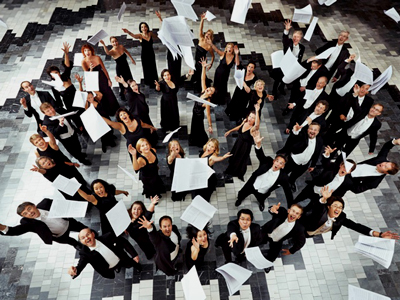
By ANDREW POWELL
Published: November 2, 2013
MUNICH — Can music be sincere and ironic at the same time? Ask Peter Dijkstra, the artistic leader of the BR Chor who last weekend (Oct. 26) led Rossini’s Petite messe solennelle as billed. Solemnly. The result sounded not much like Rossini. Nobody smiled, and the musicians looked tense on the stage of the Prinz-Regenten-Theater, even as they sang and played expertly.
But perhaps the composer was smiling, wherever he is. The famously social 71-year-old used the tuneful giddy Mass — his only complete setting of the Ordinary — to demand admission to Paradise, describing for God its ingredients: “[un] peu de science, un peu de coeur.” The year was 1863 and Paris was digesting Darwin’s De l’origine des espèces, ou Des lois du progrès chez les êtres organizés, in its first French edition. Rossini may have viewed his demand as only natural. Ditto his casting stipulation: “chanteurs des trois sexes – hommes, femmes et castrats.”
If Dijkstra’s straight face precluded irony, and with it a few musical plaisanteries, at least he secured a tidy performance. His choristers, forty strong, mustered volume sparingly, reveling most of the time in transparent textures, soft floated tones and expressive accents. The evening burst into life in their spry counterpoint for Cum Sancto Spiritu, but choral virtuosity was just as apparent in Rossini’s contrasted, wistful Sanctus.
BR Chor members could have been assigned as quartet soloists, as the composer planned. Instead, BR (Bayerischer Rundfunk) hired glamorous outsiders. Regula Mühlemann and (mezzo-soprano) Anke Vondung paired exquisitely in the soprano and alto duet Qui tollis peccata mundi. Mühlemann’s sweet, light sound and the charm of her phrasing added luster to the Thomas Aquinas hymn, O salutaris hostia, interpolated after the Sanctus by Rossini (in 1867) to press musically his case for an agreeable afterlife. Vondung attuned herself to all colleagues, singing with dynamic sensitivity and great poise. She even adjusted neatly to the sudden weight of the Agnus Dei, pleading earnestly for mercy and peace against the score’s quirky aura of melodrama.
Eric Cutler and (baritone) Michael Volle made heavy work of the tenor and bass solo parts. Cutler, alarmingly, bellowed through the Domine Deus, but he brought finesse to the ensembles. Performing on a break from a run of Les vêpres siciliennes in London, Volle brightly characterized his words.
Mordant musical wit in the Petite messe solennelle mirrors Rossini’s droll remarks in its dédicace to God and on the manuscript’s flyleaf. In a skillful reading, particularly one using the original scoring for two pianos and harmonium, as on this occasion, a thread of humor helps link the incongruous styles and moods of the individual sections, ranging as they do from jaunty to buffo to melodramatic to properly solemn.
Dijkstra erred anyway on the side of objectivity, also slowness, and passive accompaniment from the duo pianists belabored his approach. Andreas Groethuysen (principal) and Yaara Tal (second piano) hovered below the music’s surface much of the time. The bubbly rhythmic figurations in the Kyrie passed by unremarkably. The instrumental Offertorio, waggishly labeled Prélude religieux lest anyone find it misplaced, lacked shape and in fact dragged. Groethuysen faltered technically now and then as well.
In a nod to the Verdi bicentennial, Dijkstra began the concert with the unaccompanied, seldom-heard Pater noster (O Padre nostro che ne’ cieli stai) of 1878, sung mellifluously in clear Italian with restrained power. Here his straightforwardness paid off. (Mariss Jansons is chief conductor of the BR Chor.)
Photo © Johannes Rodach
Related posts:
BR’s Full-Bodied Vin Herbé
BR Chor’s St Matthew Passion
Muti Taps the Liturgy
Mariotti North of the Alps
Jansons Extends at BR
Tags: Andreas Groethuysen, Anke Vondung, Bayerischer Rundfunk, BR Chor, Chor des Bayerischen Rundfunks, Eric Cutler, Giuseppe Verdi, Max Hanft, Michael Volle, München, Munich, Pater noster, Peter Dijkstra, Petite messe solennelle, Prinz-Regenten-Theater, Regula Mühlemann, Review, Rossini, Yaara Tal